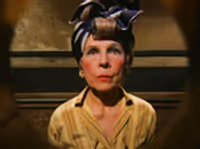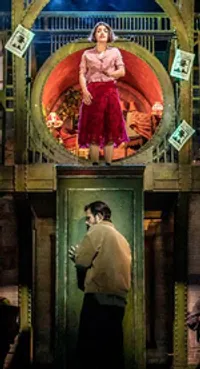What is [insert title of show]? Why is it called that?
#25What is
Posted: 12/21/21 at 1:01pm
rattleNwoolypenguin said: "Guittel’s song is trying to expand on his interpretation of it. And give it as a moment to Clara (I’ve always found it too on the nose and I don’t buy Clara being this introspective)”
I think the point of the song is that Margaret sees, for the first time, how very certain and clear Clara is about her feelings. Neither she nor the audience has seen Clara this introspective before.
In terms of the plot of the show, there's a lot riding on this song - it has to convince Margaret to change her mind completely about Clara and the possibilities for her future. (I've always thought it was vaguely comparable to "A Boy Like That/I Have a Love," in that the outcome of the show pivots on the persuasive power of one song.)
#26What is
Posted: 12/21/21 at 2:56pm
Tommy Tune on the reason it was called 9:
The composer [Maury Yeston] 9 years ago started to work on it. He saw Fellini's 8 1/2 which it is based on, inspired by, and he said well if its a musical and its the next step and we add a score we'll add a half of a point to it and we'll call it 9. Simple as that.
NINE the Musical - Interview with Tommy Tune
Alex Kulak2
Broadway Legend Joined: 9/11/16
#27What is
Posted: 12/21/21 at 4:17pm
John Adams said: "[title of show]: the braces indicate a "working title"; one that is not yet finalized. In this case, the show is so early in development that they don't even have enough of a concept to create a title that's descriptive enough beyond the basic, "title of show" (humorously lacking even capital letters).
I don't know if the writers were thinking of this when they came up with the title, but special characters like brackets would come before letters in an alphabetical list, so the show would come at the top of a catalogue of musicals available for licensing.
#28What is
Posted: 12/22/21 at 12:04am
I interpret the title song of 'The Light in the Piazza' to mean that Clara is likening her love for Fabrizio, to light itself. Most people probably can't rationally explain or understand light (I sure can't; photons?!) but they can still see by it just as well as people who understand light better. I think Clara is saying that similarly, she may not have the intellectual capacity to explain her love or even completely understand it herself, but she can still feel it just as deeply as anyone else, and so it's still valid. (Whether she would have the capacity to make such an argument is another question, but I like that she's given some voice in the show to advocate for herself, whether it's strictly realistic or not.)
And, of course, 'Clara' means 'bright', so there's also that.
seeseveryshow2
Swing Joined: 12/18/21
#29What is
Posted: 12/22/21 at 1:05am
The writers of the show were, IIRC, filling out an application to submit their show to the New York Musical Theater Festival (NYMF), which has since ceased operations. They couldn’t figure out a name for their show, so they left the application form blank where it asked for the title of the show. The show actually was produced by NYMF, and later was produced on Broadway where it was well-received but did not find enough patrons to sustain it.
#30What is
Posted: 12/22/21 at 4:07am
Fan123 said: "I interpret the title song of 'The Light in the Piazza' to mean that Clara is likening her love for Fabrizio, to light itself. Most people probably can't rationally explain or understand light (I sure can't; photons?!) but they can still see by it just as well as people who understand light better. I think Clara is saying that similarly, she may not have the intellectual capacity to explain her love or even completely understand it herself, but she can still feel it just as deeply as anyone else, and so it's still valid. (Whether she would have the capacity to make such an argument is another question, but I like that she's given some voice in the show to advocate for herself, whether it's strictly realistic or not.)
And, of course, 'Clara' means 'bright', so there's also that."
I agree with your interpretation. I think that the light in the piazza is something tangible, familiar and known to Clara. She appreciates its beauty (Tiny, sweet and then it grows and then it fills the air). Her sexual and romantic awakenings with/for Fabrizio are new and unfamiliar, however. Twice she sings, "Who knows what you call it, I don't care!" and "Who knows what you call it, but it's there!'.
Towards the end of the song she proclaims her realization, "I see it! Now I see it!". She ends the song by very simply equating the two (she doesn't even use a complete sentence to do so): "The light in the piazza... My love..."
Videos





